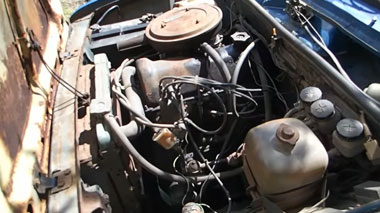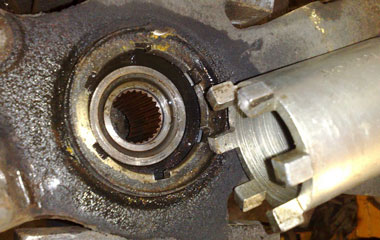
The head gasket is an important component of your car’s engine, and if it blows, it can cause some serious problems. However, you might not have any symptoms if your head gasket is blown. That being said, it’s still important to get it checked out by a mechanic as soon as possible so that they can diagnose and repair the problem before it causes any further damage.
- Check the engine oil level and quality
- If the oil is low or dirty, it may be a sign of a blown head gasket
- Inspect the coolant level and look for any leaks in the cooling system
- A blown head gasket can cause coolant to leak from the system
- Look for signs of overheating, such as an excessively hot engine or steam coming from under the hood
- These could indicate a blown head gasket
- Check for unusual exhaust smoke, such as white smoke or water vapor coming from the tailpipe
- This could also be a sign of a blown head gasket
What are the First Signs of a Blown Head Gasket?
When a head gasket blows, it can cause a multitude of problems for your engine. The first signs of a blown head gasket are often subtle, but if you know what to look for, they can be easy to spot. One common symptom of a blown head gasket is an overheating engine.
If your engine is running hot, but there are no leaks or other obvious problems, it could be a sign that the head gasket has failed. Another symptom is white smoke coming from the tailpipe. This happens when coolant leaking from the head gasket gets into the combustion chamber and is burned along with the fuel.
If you notice either of these symptoms or any others that seem unusual, it’s important to have your car checked out by a mechanic as soon as possible. A blown head gasket can cause serious damage to your engine if it’s not repaired promptly.
Can a Car Run Fine With a Blown Head Gasket?
No, a car cannot run fine with a blown head gasket. The head gasket seals the combustion chamber from the engine block and keeps coolant and oil from mixing. If the head gasket blows, it will allow coolant and oil to mix, which will ruin the engine.
What Can Be Mistaken for a Blown Head Gasket?
There are a few things that can be mistaken for a blown head gasket. One is a cracked engine block. This will cause the engine to run rough and may even cause it to overheat.
Another possibility is a blown piston ring. This will also cause the engine to run rough and may cause it to overheat as well. Finally, a clogged radiator could be causing your engine to overheat.
If your engine is overheating, it is important to have it checked out by a mechanic as soon as possible to avoid further damage.

Can I Have a Blown Head Gasket Without Overheating?
It is possible to have a blown head gasket without overheating. There are a few ways this can happen, but the most common is when there is an external leak in the cooling system. This can cause the coolant to mix with the oil and cause engine damage.
Another way it can happen is if there is a loss of compression in one or more cylinders. This can be caused by a hole in the piston or a valves that are not sealing properly.
Head Gaskets Can Blow WITHOUT Symptoms
Small Head Gasket Leak Symptoms
If your car is leaking coolant, it’s important to identify the source of the leak as soon as possible. A small head gasket leak can often be difficult to spot, as the leaks are usually very small. However, there are a few key symptoms that can help you identify a head gasket leak.
One of the most common symptoms of a head gasket leak is an overheating engine. If your car’s temperature gauge is creeping into the red zone, or if you see steam coming from under the hood, it’s likely that you have a coolant leak. Another symptom to watch for is white smoke coming from the exhaust pipe.
This can be an indication of burning coolant and is a sure sign that you have a leak. If you suspect that you have a head gasket leak, it’s important to get it checked out by a mechanic as soon as possible. Left unchecked, a head gasket leak can cause serious engine damage.

How to Fix a Blown Head Gasket Without Replacing It
A blown head gasket can be a major problem for any car owner. Not only is it an expensive repair, but it can also cause serious damage to your engine if not fixed properly. Luckily, there are a few ways to fix a blown head gasket without replacing it entirely.
One way to fix a blown head gasket is by using a sealant. There are many different types of sealants available, so be sure to choose one that is compatible with your car’s make and model. Sealants work by filling in the gaps between the cylinder head and the engine block, thus preventing coolant or oil from leaking into the combustion chamber.
Another way to fix a blown head gasket is by replacing just the damaged area of the gasket. This can be done by removing the cylinder head and taking out the old gasket material. Once the new gasket material is in place, you can then bolt everything back together and torque it to factory specifications.
Of course, the best way to avoid having to deal with a blown head gasket is to prevent it from happening in the first place. Be sure to regularly check your coolant level and change it when necessary.
Symptoms of a Blown Head Gasket
A blown head gasket is one of the most serious engine problems that can occur in a car. If your head gasket has blown, it means that there is a hole in it and coolant or oil is leaking into the cylinders. This can cause the engine to overheat and seize up.
The symptoms of a blown head gasket can be difficult to diagnose because they may mimic other engine problems. If you suspect that your head gasket may be blown, look for these signs: -White smoke coming from the exhaust
-Overheating engine
-Coolant leaks
-Oil leaks
If you notice any of these symptoms, take your car to a mechanic as soon as possible for repairs. A blown head gasket is a serious problem but it can be fixed if caught early enough.
Can a Head Gasket Blown Without Overheating
A head gasket can certainly blow without the engine overheating. In fact, many times an engine will continue to run after the head gasket has failed, although it will eventually overheat and cause damage to the engine. The most common cause of a blown head gasket is simply wear and tear; as an engine ages, the head gasket becomes less able to withstand the high temperatures and pressures inside the engine.
Other causes of a blown head gasket include improper installation, manufacturing defects, or using the wrong type of gasket for the application.
If you think you may have a blown head gasket, it’s important to get your vehicle to a mechanic as soon as possible. A blown head gasket can cause all sorts of problems including coolant leaks, oil leaks, loss of power, and eventually complete engine failure.
Don’t take chances with your vehicle – if you think there may be an issue with the head gasket, have it checked out right away!
Conclusion
If you have a head gasket leak, it’s possible that you may not experience any symptoms. However, if the leak is severe, you may notice engine overheating, coolant leaks, or white smoke coming from your tailpipe. If you think you might have a head gasket leak, it’s important to get it checked out by a mechanic as soon as possible.







































